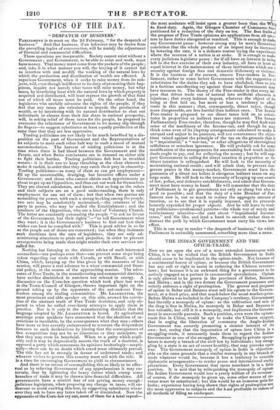THE INDIAN GOVERNMENT AND THE OPIUM-TRADE.
Now we are upon the eve of a more extended intercourse with China, it is to be wished that the British Government in India should cease to be implicated in the opium-trade. Not because of a sentimental horror of opium, or because the British Government has any call or right to assist in enforcing the Chinese revenue- laws ; but because it is an awkward thing for a government to be actively engaged as a partner in commercial speculations. Opium is only allowed to be grown in the provinces of Bahar, Benares, and Malwa ; and in the two former the Government possesses and strictly enforces a right of preemption. The grower and preparer of opium in Behar and Benares must sell his opium to the Govern- ment, at a fixed price, and that much below the usual market-price. Before Malwa was included in the Company's territory, Government had literally a monopoly of opium : as the cultivation and sale of the drug is free in Malwa, its monopoly in Bahar and Benares is less valuable, but still it is a monopoly, and implicates the Govern- ment in mercantile pursuits. Such a position, even were the opium- trade free in China, would be apt to make the Chinese suspect, that in urging the liberation of commerce the Anglo-Indian Government was covertly promoting a sinister interest of its own : but, seeing that the importation of opium into China is a smuggling-trade, it necessarily leads them to regard the Indian Government as one of the smugglers. Smuggling by private specu- lators is merely a breach of the civil law by individuals ; but smug- gling by a state is an act of covert hostility, that may provoke open war. The Government monopoly of opium in India is objection- able on the same grounds that a similar monopoly in any branch of trade whatever would be, because it has a tendency to unsettle diplomatic arrangements—to render peace and international amity precarious. Every Government that turns merchant is in a false position. It is said that by relinquishing the monopoly of opium the Indian Government would lose a yearly million of its revenue: of course, if the monopoly be given up, some other means of re- venue must be substituted ; but this would be an immense gain for India ; experience having long shown that rights of preemption are the most oppressive to subjects and the least profitable to rulers of all methods of filling an exchequer.


























 Previous page
Previous page